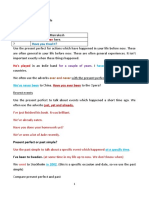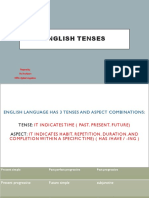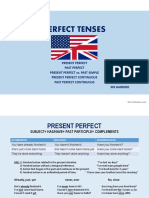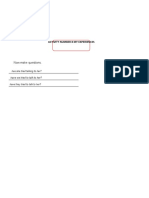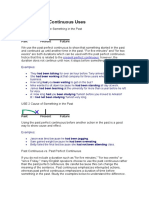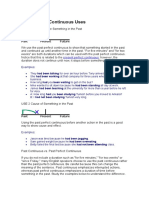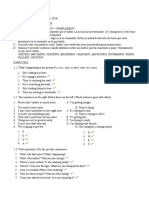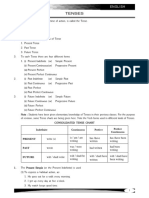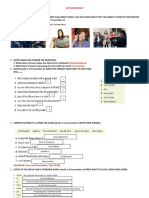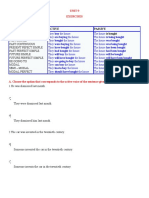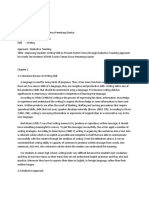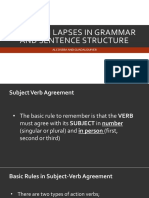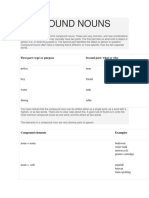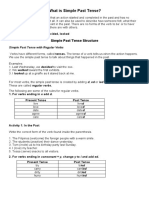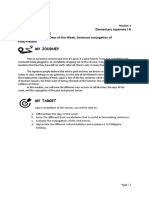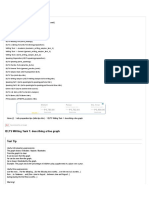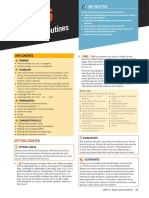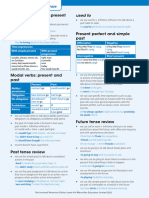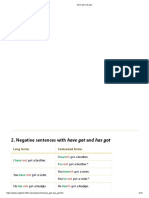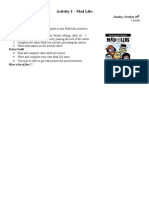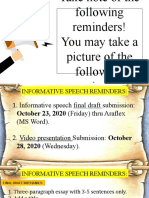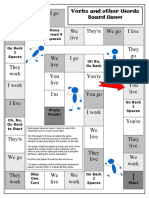The Present Tense - Present Perfect
The Present Tense - Present Perfect
Uploaded by
Anderson ArevaloCopyright:
Available Formats
The Present Tense - Present Perfect
The Present Tense - Present Perfect
Uploaded by
Anderson ArevaloOriginal Description:
Original Title
Copyright
Available Formats
Share this document
Did you find this document useful?
Is this content inappropriate?
Copyright:
Available Formats
The Present Tense - Present Perfect
The Present Tense - Present Perfect
Uploaded by
Anderson ArevaloCopyright:
Available Formats
The Present Tense – Present Perfect
There are three aspects of the present tense: = truth of a fact
1) Simple present
2) Present progressive now
A time in the
3) Present perfect (simple and progressive) past
The present perfect (simple) tense is used to describe a fact that has been true from
sometime in the past and continues to be true up through the present.
• Use the helping verb “has” before a verb in present perfect simple tense to describe (he,
she, it).
• Use the helping verb “have” before a verb in the present perfect simple tense when used
to describe all other subjects (I, we, you, they).
he / she / it [has] [verb in participle form]
I / we / you / they [have] [verb in participle form]
Example: It has rained a lot this week.
Example: I have flown on an airplane before.
• Use the helping verb “been” after “have” or “has” when using the verb “to be” in the
present perfect simple tense.
he / she / it [has] [been] [object clause]
I / we / you / they [have] [been] [object clause]
Examples: It has been a secret for thirty years.
They have been nice in the past.
1. COMPLETE THE FOLLOWING SENTENCES IN THE PRESENT PERFECT
SIMPLE TENSE.
1) She has been (to be) happy all day.
2) It has always snowed (to snow) here in December.
3) Dan has been (to be) sick for three days.
4) Li and Susan have tried (to try) four times already and will not give up.
5) The old car has been (to be) a piece of junk since I bought it.
6) We have not taken(to take) this test before.
7) My uncle has been (to be) to China.
8) Our father has never driven (to drive) to California before.
9) I have spoken (to speak) to the president before.
10) The old man has occasionally needed (to need) help crossing the street.
2. PUT THE FOLLOWING SENTENCES IN PRESENT PERFECT SIMPLE TENSE.
1) I do the laundry.
I have done the laundry
2) It is cold.
It has been cold.
3. NOW MAKE YOUR OWN SENTENCES IN THE PRESENT PERFECT SIMPLE
TENSE.
1) They have completed the project
2) He has forgotten what I said
The present perfect (progressive) tense is used to describe an action that has already
begun to happen sometime in the past and continues to happen up through the present.
• Use the helping verb phrase “has been” before a verb in present perfect progressive
tense to describe (he, she, it).
• Use the helping verb phrase “have been” before a verb in the present perfect
progressive tense when used to describe all other subjects (I, we, you, they).
he / she / it [has] [been] [verb + “ing”]
I / we / you / they [have] [been] [verb + “ing”]
Examples: He has been running for twenty minutes. = action
I have been running for twenty minutes.
now
A time in the past
4. WRITE THE CORRECT FORM OF THE VERB IN THE SPACES BELOW.
1) We have been learning (to learn) English for one hour.
2) He has been going (to go) to school here for five years.
3) I have been playing (to play) the piano since I was eight years old.
4) Li has been talking (to talk) on the phone for forty five minutes.
5) Wang, Ted, and Ko have been driving (to drive) since morning.
6) Andy and I have been looking (to look) for my keys for two hours.
7) The Colorado River has been flowing(to flow) for centuries.
8) My CD player has been skipping (to skip) since I bought it.
9) Tommy has not been saving (to save) his money for eight years.
10) Nidia has been running (to run) in the race for six minutes.
5. PUT THE FOLLOWING SENTENCES IN PRESENT PERFECT PROGRESSIVE
TENSE.
1) I make cakes.
I have been making cakes.
2) The car does not start.
The car has not been starting.
6. NOW MAKE YOUR OWN SENTENCES IN THE PRESENT PERFECT PROGRESSIVE
TENSE.
1) I’ve been cooking something special for you
2) We’ve been living here for two years
7. COMPLETE THE SENTENCES WITH THE VERB IN BRACKETS IN PAST
SIMPLE OR PRESENT PERFECT.
1. She loves Paris. She has been (be) there many times.
2. Bill has worked (work) in that company for 3 years. (He still works there).
3. They went (go) to London on holiday last summer.
4. I have read (read) that book. It´s good.
5. His parents were (be) here yesterday.
6. They went (go) to Germany when he was (be) only 4.
7. Did you watch (watch) a film last night?
8. I had (have) some toast when I got up.
9. He has lived (live) in Rome since he was a teenager.
10. The house looks different. Have you painted (paint) it?
11. I did not see (not see) you in class last Friday.
12. Shakespeare wrote (write) over one hundred sonnets.
13. I was (be) there when you bought it.
14. I have lived (live) here since I was a baby.
15. Ten years ago, I met (meet) Claire for the first time.
16. We have visited (visit) Cornwall every summer since I was twelve!
17. I have never seen (never see) you look so happy!
18. Last week, I took (take) my exams.
8. SAY IF THE FOLLOWING SENTENCES ARE RIGHT OR WRONG. CORRECT
THEM IF NECESSARY.
1. Have you ever been to Thailand? RIGHT
2. I´ve had sausages for lunch at half past one. wrong
3. She´s enjoyed herself at the party last night. wrong
4. I´ve read that book but I didn´t like it much. r i g h t
5. Tom has left school one year ago. wrong
6. My cousins have lived in Dublin since they´ve been children.wrong
7. We have worked here for a year and a half r i g h t
8. My parents lived in Britain for a couple of years. r i g h t
9. James has made a cake yesterday wrong
10. I´ve washed the car. It looks great now. r i g h t
9. COMPLETE THE SENTENCES WITH A VERB FROM THE BOX IN PRESENT
PERFECT OR PAST SIMPLE.
b finish stop wat
e smoke enjoy ch
n win live
o
t
1. She stopped smoking two months ago.
2. She hasn´t smoked for two months.
3. Have you ever been to Florence?
4. Did you watch that TV show last night?
5. They still live in that town. They have lived there for ages.
6. A friend of mine won the lottery three years ago.
7. When did you finish your homework?
8. They enjoyed themselves at the party last summer.
You might also like
- The Present Tense - Present PerfectDocument4 pagesThe Present Tense - Present PerfectMateo PatiñoNo ratings yet
- Present Perfect Tense 1Document2 pagesPresent Perfect Tense 1mheaxkNo ratings yet
- JWJWJWDocument26 pagesJWJWJWShankSoham MohantyNo ratings yet
- The Present Perfect Continuous TenseDocument17 pagesThe Present Perfect Continuous TenseAmbardedew 013No ratings yet
- Unit 3 Grammar: Present Perfect TenseDocument38 pagesUnit 3 Grammar: Present Perfect TenseGlayberson Pereira100% (1)
- Past Simple - Present Perfect ExercisesDocument3 pagesPast Simple - Present Perfect ExercisesNikolina MrakNo ratings yet
- Present Perfect Simple Tense: Unfinished ActionsDocument11 pagesPresent Perfect Simple Tense: Unfinished ActionsLurina NataliiaNo ratings yet
- Notes On Tenses in EnglishDocument5 pagesNotes On Tenses in EnglishDiana DussemNo ratings yet
- Bài Tập Ngữ Pháp Lớp Giao Tiếp in 25 BảnDocument48 pagesBài Tập Ngữ Pháp Lớp Giao Tiếp in 25 BảnTrần HàNo ratings yet
- TALLERnPRESENTnPERFECTnREALIZADOn1 5760ca88564effaDocument6 pagesTALLERnPRESENTnPERFECTnREALIZADOn1 5760ca88564effaYULY BUITRAGONo ratings yet
- Test-Paper (Iind Year)Document2 pagesTest-Paper (Iind Year)Alexandru OlariNo ratings yet
- Ingles 2 - Finales - Ejercicios ResueltosDocument9 pagesIngles 2 - Finales - Ejercicios ResueltosMamani Mamani Damaris PriscilaNo ratings yet
- Past Simple Vs Present PerfectDocument4 pagesPast Simple Vs Present PerfectLolaMilickovicNo ratings yet
- PP Present Perfect Overview Exercises 1Document2 pagesPP Present Perfect Overview Exercises 1Charlotte McGillivrayNo ratings yet
- The Present PerfectDocument26 pagesThe Present PerfectRAYZA ARIEL CURI ALCANTARANo ratings yet
- Taller Grado 10a-BDocument3 pagesTaller Grado 10a-BRosa TeranNo ratings yet
- Present Perfect Simple - ContinuousDocument7 pagesPresent Perfect Simple - ContinuousLaura CroitoruNo ratings yet
- Inter GrammarDocument30 pagesInter GrammarYamin PhyoNo ratings yet
- Present Past PerfectDocument7 pagesPresent Past PerfectDalila castañedaNo ratings yet
- Past PerfectDocument13 pagesPast PerfectMarita KumalaNo ratings yet
- Form: HAVE / HAS + Past ParticipleDocument2 pagesForm: HAVE / HAS + Past ParticipleMonica AndreeaNo ratings yet
- Unit 3-Stories Grammar Exercises Modal AnswersDocument5 pagesUnit 3-Stories Grammar Exercises Modal AnswersMarianne Emil-1051No ratings yet
- English Tenses: Prepared By: Ms. Hira Karim M.Phil. Applied LinguisticsDocument35 pagesEnglish Tenses: Prepared By: Ms. Hira Karim M.Phil. Applied LinguisticsEsha AfzalNo ratings yet
- Prepared by L.Baranova,: Teacher of EnglishDocument17 pagesPrepared by L.Baranova,: Teacher of EnglishРуслан СавчукNo ratings yet
- Grammar:: Present Perfect TenseDocument38 pagesGrammar:: Present Perfect TenseKristerann JimenezNo ratings yet
- Form 1 Immersion Bridging Programme - English Assignment Myself and My FamilyDocument15 pagesForm 1 Immersion Bridging Programme - English Assignment Myself and My FamilyMummy HartiniNo ratings yet
- Tense: Es Add For The Third Person Singular (Works, Goes)Document16 pagesTense: Es Add For The Third Person Singular (Works, Goes)api-19776105No ratings yet
- Who Lives in Australia: Who: My Friend Is A NurseDocument26 pagesWho Lives in Australia: Who: My Friend Is A Nurseครูปัณณภัสร์ สวัสดิ์ภัสร์No ratings yet
- Past Perfect ContinuousDocument6 pagesPast Perfect ContinuousHelena SouzaNo ratings yet
- Activity Number 8 My Experiences: Now Make QuestionsDocument2 pagesActivity Number 8 My Experiences: Now Make QuestionsFlor Maria CardosoNo ratings yet
- Unit 3 - Tenses - ReviewDocument28 pagesUnit 3 - Tenses - ReviewVincentius Adiprana NugrohoNo ratings yet
- Past Tense HandoutDocument7 pagesPast Tense HandoutAnaNițuNo ratings yet
- Perfect TensesDocument9 pagesPerfect TensesFREED 777No ratings yet
- Activity Number 8 My Experiences: Now Make QuestionsDocument2 pagesActivity Number 8 My Experiences: Now Make QuestionsFlor Maria CardosoNo ratings yet
- Grammar 2Document17 pagesGrammar 2dy.chairunnisaNo ratings yet
- present perfect tenseDocument27 pagespresent perfect tensecansumlkc599No ratings yet
- Unit 3 - Talking About ExperienceDocument21 pagesUnit 3 - Talking About ExperienceRizal AdityaNo ratings yet
- Past Perfect Continuous Uses: ExamplesDocument7 pagesPast Perfect Continuous Uses: ExamplesAna NavarroNo ratings yet
- PRESENT PERFECT TENSE (3 ЗАНЯТТЯ)Document15 pagesPRESENT PERFECT TENSE (3 ЗАНЯТТЯ)JuliaNo ratings yet
- Betty Azar - Understanding and Using English Grammar - Chapter 5-Adv Clauses of Time and REVIEW of Verb TensesDocument18 pagesBetty Azar - Understanding and Using English Grammar - Chapter 5-Adv Clauses of Time and REVIEW of Verb Tenseskhai13102005No ratings yet
- Deberes de InglésDocument7 pagesDeberes de InglésAna NavarroNo ratings yet
- Do The Exercises Below On The Simple Past Tense and Click On The Button To Check Your Answers. The Simple Past TenseDocument18 pagesDo The Exercises Below On The Simple Past Tense and Click On The Button To Check Your Answers. The Simple Past TenseArmando ChavezNo ratings yet
- PEP 5A - Present ContinuousDocument9 pagesPEP 5A - Present ContinuousSakana SopheakNo ratings yet
- Present Perfect: Activity Number 8 My ExperiencesDocument3 pagesPresent Perfect: Activity Number 8 My ExperiencesFlor Maria CardosoNo ratings yet
- Activity 8 My ExperiencesDocument3 pagesActivity 8 My ExperiencesFlor Maria CardosoNo ratings yet
- Brown Aesthetic Group Project PresentationDocument44 pagesBrown Aesthetic Group Project Presentationmutiah mutiaraNo ratings yet
- Exercise Your Past Tense With KeyDocument8 pagesExercise Your Past Tense With KeyAnaNițuNo ratings yet
- Present Perfect and Present Perfect ContinuousDocument6 pagesPresent Perfect and Present Perfect ContinuousNguyen Phuc LocNo ratings yet
- Present Perfect and Present Perfect ContinuousDocument6 pagesPresent Perfect and Present Perfect ContinuousViệt ĐàoNo ratings yet
- English Grammar in UseDocument5 pagesEnglish Grammar in UseLidiaNo ratings yet
- ACTIVITY and GUIDE 3 - Quiz Corregido y CorreccionesDocument8 pagesACTIVITY and GUIDE 3 - Quiz Corregido y CorreccionesAny CorenaNo ratings yet
- E1 VerbTenses SeminarDocument16 pagesE1 VerbTenses SeminarLusia Barna100% (1)
- English Grammar ExerciseDocument4 pagesEnglish Grammar Exerciseanon_404586944No ratings yet
- Pertemuan Ke Ix, Materi Dan TugasDocument16 pagesPertemuan Ke Ix, Materi Dan TugasGilang MarioNo ratings yet
- Present Perfect Simple ContinuousDocument17 pagesPresent Perfect Simple ContinuousLiliana RaduNo ratings yet
- ch2 TensesDocument10 pagesch2 Tenses車子No ratings yet
- Tenses: EnglishDocument6 pagesTenses: Englishnathbalia62No ratings yet
- Simple Past: Did You Call Debbie?Document8 pagesSimple Past: Did You Call Debbie?InesNo ratings yet
- Learn English 1 with Audio and Video: Learn English, #1From EverandLearn English 1 with Audio and Video: Learn English, #1Rating: 4 out of 5 stars4/5 (8)
- Important: Life Soundtrack Listening 1Document7 pagesImportant: Life Soundtrack Listening 1Anderson ArevaloNo ratings yet
- HOMEWORKDocument5 pagesHOMEWORKAnderson ArevaloNo ratings yet
- Tense Active Passive Present Simple Is Bought: Unit 9 ExercisesDocument6 pagesTense Active Passive Present Simple Is Bought: Unit 9 ExercisesAnderson ArevaloNo ratings yet
- Unit 2-Lesson 3 Sound Interesting! 1. Label The Pictures With Some of These WordsDocument6 pagesUnit 2-Lesson 3 Sound Interesting! 1. Label The Pictures With Some of These WordsAnderson ArevaloNo ratings yet
- Reporting VerbsDocument2 pagesReporting VerbsAnderson ArevaloNo ratings yet
- Seminar On ELTDocument4 pagesSeminar On ELTSumi Butar-butarNo ratings yet
- Bac Revision Mme Lazghab ZaratDocument30 pagesBac Revision Mme Lazghab ZaratAhlem MansouriNo ratings yet
- Common Lapses in Grammar and Sentence StructureDocument26 pagesCommon Lapses in Grammar and Sentence StructureClarence Lyn Dela CruzNo ratings yet
- Compound NounsDocument26 pagesCompound NounsnorlyarchboldNo ratings yet
- Adjective Clauses RulesadDocument3 pagesAdjective Clauses RulesadPaul AndresNo ratings yet
- LESSON 1-Hangul Alphabet System: Learn Korea!Document8 pagesLESSON 1-Hangul Alphabet System: Learn Korea!Iva ShafiKahNo ratings yet
- DLL - EN6 1st Quarter Week 9 Day 3Document3 pagesDLL - EN6 1st Quarter Week 9 Day 3Jeclyn D. Filipinas100% (2)
- Laser A1plus Word ListDocument10 pagesLaser A1plus Word ListPeggy ThomaNo ratings yet
- Module-2-Additional EnglishDocument4 pagesModule-2-Additional EnglishCardia MagzNo ratings yet
- Effective Reading 1 - Chap 1 - New LivesDocument8 pagesEffective Reading 1 - Chap 1 - New Livessaji.alarosyNo ratings yet
- Republic of The Philippines Department of Education Region Ix - Zamboanga Peninsula Schools Division of Dapitan City San Pedro, Dapitan CityDocument6 pagesRepublic of The Philippines Department of Education Region Ix - Zamboanga Peninsula Schools Division of Dapitan City San Pedro, Dapitan CityEljean LaclacNo ratings yet
- Module 3Document31 pagesModule 3Janice AbadNo ratings yet
- ENG-Translate-Chapter 1Document4 pagesENG-Translate-Chapter 1Canh NguyenNo ratings yet
- Grade 6 - Gr-Unit 2Document18 pagesGrade 6 - Gr-Unit 2MoAlaa JarkassNo ratings yet
- IELTS Exam Preparation - IELTS Writing Task 1 - Describing A Line Graph PDFDocument4 pagesIELTS Exam Preparation - IELTS Writing Task 1 - Describing A Line Graph PDFdigitalalchemist23No ratings yet
- Work and Routines: Unit ContentsDocument10 pagesWork and Routines: Unit ContentsВиктория МалюгинаNo ratings yet
- Nouns Lesson Plan and AnalysisDocument7 pagesNouns Lesson Plan and Analysisapi-271957009No ratings yet
- Grammar ReferenceDocument18 pagesGrammar ReferenceEnderman FacheroNo ratings yet
- Have Got, Has GotDocument4 pagesHave Got, Has GotDarwin MoraNo ratings yet
- Unit: Valparaíso, World Site Heritage: Target Population: Entry Behavior SkillsDocument6 pagesUnit: Valparaíso, World Site Heritage: Target Population: Entry Behavior SkillsClaudia Alejandra Cárdenas VargasNo ratings yet
- Activity 1 - Mad LibsDocument4 pagesActivity 1 - Mad Libsapi-298144022No ratings yet
- Gerund, Infinitive (To)Document5 pagesGerund, Infinitive (To)Nafisa RoslaniaNo ratings yet
- Narrative TextDocument14 pagesNarrative Textzainatul azzahraNo ratings yet
- S V AgreementDocument47 pagesS V AgreementRAINIER DE JESUS100% (1)
- Academic Writing GuideDocument32 pagesAcademic Writing GuidekaavyaNo ratings yet
- Board Game - Verbs and Other Words PDFDocument3 pagesBoard Game - Verbs and Other Words PDFalisNo ratings yet
- Performdigi: The Sentence in English GrammarDocument5 pagesPerformdigi: The Sentence in English Grammarmuhammad arshidNo ratings yet
- B.inggris Genres of English TextDocument10 pagesB.inggris Genres of English Textphonie tri mutiaryNo ratings yet
- ESL001 - Elementary English As A Second LanguageDocument17 pagesESL001 - Elementary English As A Second Languagenghinhphong tanchieuNo ratings yet
- GEC 3 Module 2Document11 pagesGEC 3 Module 2samanthachua155No ratings yet

















